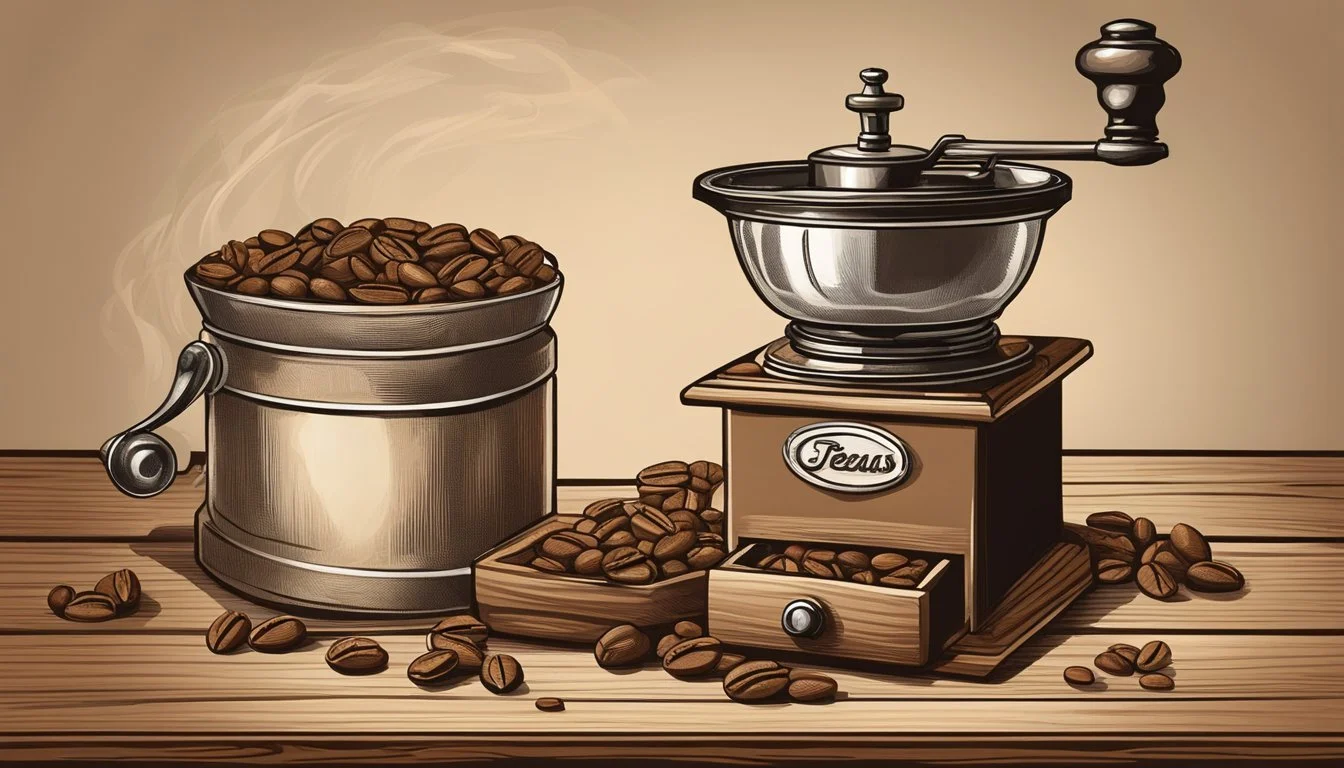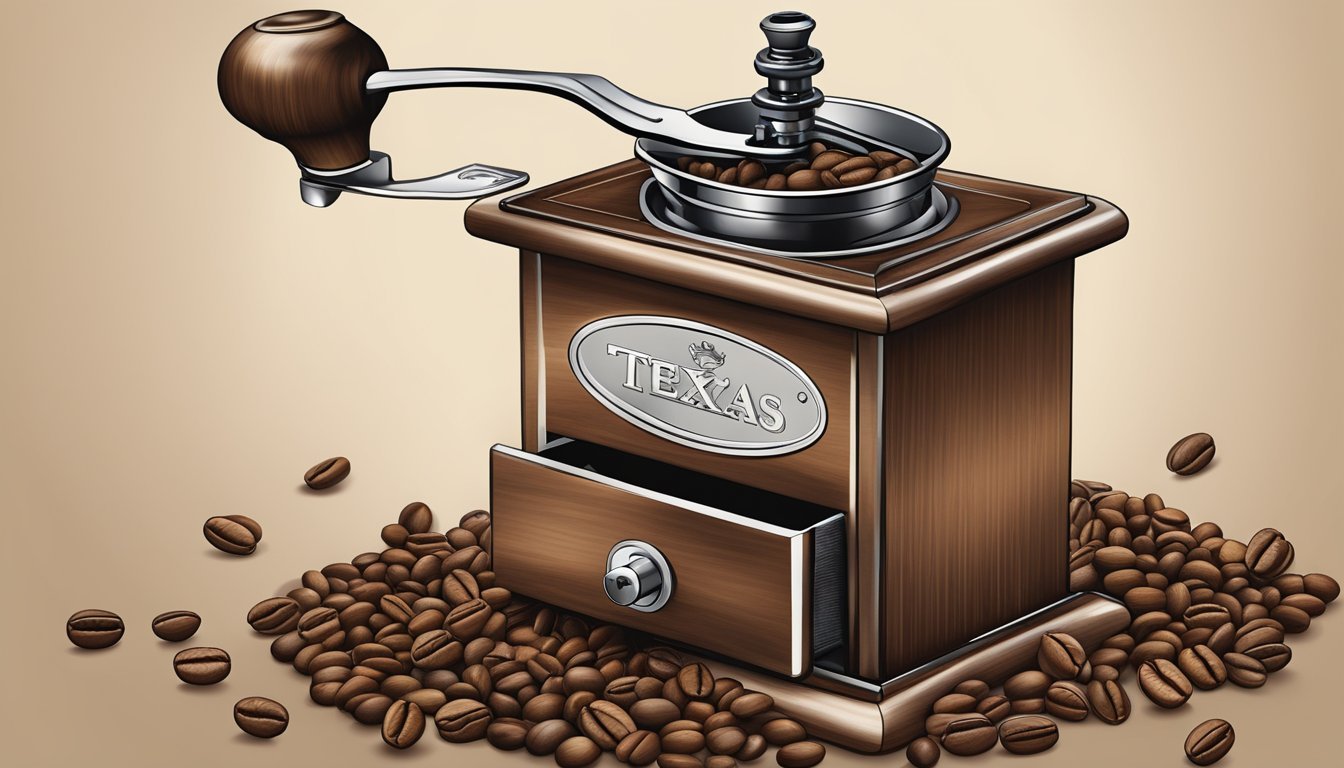How to Brew the Perfect Cup of Texas Pecan Coffee
Expert Tips for a Flavorful Morning
The love for coffee traverses all boundaries, connecting diverse palates across the world. Texas pecan coffee, a variant that's become a staple in the Southern United States, has secured its place on a global stage. This specialty brew combines the rich, full-bodied taste of coffee with the nutty essence of Texas-grown pecans, offering a unique flavor profile highly sought after by coffee enthusiasts and casual drinkers alike.
In the heart of Texas, local farms diligently cultivate pecan trees, the state tree of Texas, to produce the high-quality nuts that define this regional coffee. The availability of Texas pecans is not just a point of state pride but also contributes to a thriving local market, ensuring that consumers get a product that's both fresh and authentic. When these native pecans are meticulously blended with world-class coffee beans, the result is Texas pecan coffee—a brew that exudes comfort with each sip.
Mastering the perfect cup of Texas pecan coffee requires precision, from the selection of the finest beans to the final pour. The process is an art, highly dependent on technique and the use of quality ingredients. Using a measured approach, enthusiasts can grind freshly roasted beans to their preference, combine them with the right amount of water, and brew a cup that not only invigorates the senses but also pays homage to the flavorsome Texan heritage.
History and Origin of Texas Pecan Coffee
In the rich tapestry of Texas' culinary innovations, pecan coffee stands out for its unique blend of local pecans and high-quality arabica beans, marrying the state's heritage with a global coffee culture.
Pecan Coffee Evolution in Texas
The inception of Texas pecan coffee is a testament to the Lone Star State's tradition of pecan farming, melded skillfully with coffee roasting. As a region native to pecan trees, Texas took the logical step of infusing the nutty pecan flavor into coffee. Pecan coffee began as a local delicacy before gaining popularity, evolving from small-scale production on pecan farms to a widely cherished commodity in Texas's food culture.
The Global Love for Texas Pecan Coffee
Texas pecan coffee has garnered global love for its unique flavor profile. The distinctive taste of Texas pecan flavors has transcended the state's borders, making it a sought-after variety in cafes and homes worldwide. It is a celebration of regional taste that appeals to a vast audience, beyond just native Texans or those in the region.
Arabica Beans and Texas Pecan Blends
The base of Texas pecan coffee is typically 100% arabica beans, preferred for their smoother and more flavorful characteristics. When these high-quality arabica beans are responsibly sourced and carefully roasted, they act as the perfect canvas for the rich, buttery notes of Texas pecan. The result is a medium-bodied coffee that delights the palate with creamy caramel and deep pecan flavors, a true homage to the Texan spirit.
Selecting Quality Pecan Coffee Beans
When embarking on the pursuit of the perfect cup of Texas pecan coffee, one's selection of quality beans is paramount. Not only do these beans need to embody the rich, nutty essence of Texas pecans, but they must also adhere to high standards of freshness and roasting quality.
Whole Bean vs Ground Coffee
Whole Bean Coffee: For the freshest flavor, purchasing whole bean coffee is the superior choice. It allows for grinding just before brewing, which retains the oils and aromas that define pecan coffee's signature taste.
Benefits of Whole Bean Drawbacks of Whole Bean + Retains flavor better - Requires time and equipment to grind + Longer shelf life for freshness - Less convenient than pre-ground options + Full control over grind size for brewing
Ground Coffee: While ground coffee offers convenience, it may sacrifice the nuanced flavors of pecan coffee as it oxidizes faster, resulting in a shorter peak freshness period.
Benefits of Ground Coffee Drawbacks of Ground Coffee + Convenient and ready to brew - Loses flavor faster than whole beans + No need for additional grinding equipment - Provides limited control over grind size
Identifying Freshness and Quality Beans
Freshness: A coffee bean's freshness can be discerned by its appearance and aroma. Quality beans with freshness intact often exhibit a slight oily sheen and emit a robust, inviting scent. Beans should not appear too dry or lack aroma, as this can indicate staleness.
Roasted Date: Always check for a roast date on the packaging – the closer to the roast date, the fresher and more flavorful the coffee will be.
Quality Beans: Texas pecan coffee should ideally be made with high-quality Arabica beans, known for their naturally sweet and complex profiles, which complement the pecan flavor.
Indicators of Quality - Beans have consistent size and color - Packaging provides transparency of origin - No presence of defects, like cracks or insects
To ensure optimal quality, it is also recommended to source beans from reputable roasteries that prioritize sustainable and ethical farming practices. Quality beans not only contribute to the cup's final taste but support responsible agriculture.
The Roasting Process
The perfect brew of Texas Pecan Coffee hinges on its roasting process, where the development of the bean's oil and flavor is mastered through precise heat application and timing.
Medium Roast and Flavor Development
The medium roast is pivotal in the creation of Texas Pecan Coffee. During the roasting, the coffee beans are heated until they reach a medium brown color, typically at temperatures between 410-430°F (210-220°C). It is at this point that the beans exhibit a balanced aroma, acidity, and full-bodied flavor that is neither too light nor too harsh. The medium roast also preserves the unique nutty character of the pecan, melding it subtly with the coffee's natural flavors.
Temperature Range: 410-430°F (210-220°C)
Color: Medium Brown
Flavor Profile: Balanced Aroma, Nuttiness, Medium Body
Roasting Techniques for Pecan Coffee
The technique used in roasting pecan coffee is crucial to achieving the desired flavor profile. Specialty roasters often roast pecan nuts separately before blending them with the coffee beans. This ensures that the natural oils from the pecans integrate well with the coffee, enhancing the rich, nutty flavor without overwhelming the coffee's own characteristics.
Separate Roasting: Ensures even oil distribution
Blend Post-Roasting: Combines the aroma of pecans and coffee
Taste Ensured: Nuttiness complements without overpowering
Using a reliable thermometer and timer, roasters can monitor the heat level and duration meticulously to prevent over-roasting, which can lead to bitterness and obscure the pecan coffee's desired nuttiness.
Grinding for Optimal Flavor
The grind of Texas Pecan Coffee beans is paramount in the quest for optimal flavor. Precision in grind size ensures maximum flavor extraction tailored to the brewing method.
Coffee Grinder Types
There are primarily two types of coffee grinders that connoisseurs use for making the perfect cup: blade grinders and burr grinders. Blade grinders are less expensive but can create uneven grounds. On the other hand, burr grinders offer a consistent grind leading to balanced flavor extraction. They function by crushing the beans between a non-moving surface and a grinding wheel and allow for precise grind size adjustments.
Blade Grinder: Inexpensive, less consistent grind size, can cause heat that might affect flavor.
Burr Grinder: Greater cost, consistent grind, multiple grind size settings, recommended for optimal flavor.
Grind Size and Coffee Extraction
The grind size of the coffee beans significantly affects the extraction process and, therefore, the overall flavor profile of the brew. A finer grind increases the surface area in contact with water, enhancing extraction but can lead to over-extraction if too fine. Over-extraction will give coffee a bitter taste. Conversely, a coarser grind slows down the extraction, ideal for methods like French press, which have longer brew times. However, too coarse a grind can lead to under-extraction, making the coffee weak and sour.
Fine Grind: Ideal for espresso, it extracts quickly due to increased surface area.
Medium Grind: Suitable for drip and pour-over methods, it balances extraction time and flavor clarity.
Coarse Grind: Best for French press, extends extraction time, avoiding bitterness.
Correctly matching the grind size with the extraction method is crucial for highlighting the rich, nutty notes of Texas Pecan Coffee while maintaining its unique flavor profile.
Brewing the Perfect Cup
When brewing Texas Pecan Coffee, the nuances of water quality, method, time, and temperature are pivotal. Each factor contributes to extracting the vibrant flavors and rich aroma characteristic of this regional specialty.
Water Quality and Coffee Brewing
The quality of water is fundamental in coffee brewing. It should be filtered water to remove impurities that can affect the taste. For Texas Pecan Coffee, soft to moderately hard water is ideal to highlight its unique nutty notes without overpowering its delicate sweetness and balanced acidity. Water should make up about 98% of the brew, so its quality can significantly affect the coffee's final taste and body.
Filtered Water: Ensures a pure base, free of off-flavors.
Soft to Moderately Hard: Best complements pecan coffee's profile.
Brewing Methods: French Press and Pour-Over
Two popular methods to brew Texas Pecan Coffee are the French Press and Pour-Over. Each method affects the coffee's body and taste differently:
French Press:
Produces a full-bodied brew with more oils, which can highlight the rich, nutty flavor of Texas Pecan Coffee.
Typically involves a coarser grind and a brewing time of 4 minutes.
Pour-Over:
Offers a cleaner cup with pronounced clarity and highlights the beverage's natural acidity.
Required a medium-fine grind, with a brewing process that can last 3 to 4 minutes depending on the desired strength.
Method Grind Size Brew Time Taste Note French Press Coarse 4 minutes Full-bodied Pour-Over Medium-fine 3-4 minutes Cleaner, Acidity-focused
The Role of Time and Temperature in Brewing
Time and temperature are critical components in brewing the perfect cup of Texas Pecan Coffee. They govern the extraction rate and consequently, the final taste of the coffee. A general guideline is to brew at a temperature around 205°F (96°C), just below boiling, to optimally extract flavors without causing bitterness or a burnt taste.
Espresso: Shorter brew time at high pressure, approximately 20-30 seconds.
French Press: Longer brew time, around 4 minutes, with no pressure.
Pour-Over: Controlled and gradual pour with a total brew time of about 3-4 minutes.
Brewing Method Temperature Brew Time Extraction Espresso 185°F - 205°F 20-30 seconds Intense, quick French Press 195°F - 205°F 4 minutes Full, even Pour-Over 195°F - 205°F 3-4 minutes Gradual, clean
Adhering to these guidelines ensures a brew that is harmonious with the Texas Pecan Coffee's signature taste profile – rich, sweet, and slightly nutty with a pleasant body.
Enhancing Pecan Coffee Flavors
The pursuit of the perfect cup of Texas Pecan Coffee involves understanding the balance of flavors and the methods to enhance the natural pecan taste.
Natural vs Artificial Flavorings
Selecting the right flavorings is crucial in the enhancement of pecan coffee. Natural flavorings such as real pecan extracts and pecan nuts bring a genuine nutty flavor to the brew, providing a depth that resonates with the original profile of a true Southern beverage. They excel at imparting a rich and authentic pecan taste.
On the other hand, artificial flavorings offer consistency and can still yield an appealing pecan profile to your cup. These flavorings are synthesized to mimic the natural taste of pecans and often come in the form of oils and essences. However, discerning palates may detect differences between the natural and manufactured tastes.
Additional Ingredients for a Unique Twist
Innovative ingredients can add a unique twist to the classic pecan flavor:
Creamy Additions: Incorporation of creamy caramel or buttery components, such as a swirl of caramel sauce or a pat of real butter, can provide a luxuriously smooth texture and complement the inherent sweetness of pecans.
Sweet Enhancers: A sprinkle of brown sugar or pecan butter can elevate the sweetness and create a harmonious bridge between the coffee's natural bitterness and the sweet, nutty pecan notes.
Pecan Liqueur: For an adult version, a splash of pecan liqueur can intensify the flavor while adding a sophisticated twist to the coffee experience.
Incorporating these elements into Texas Pecan Coffee tailors the beverage to personal tastes, making each sip a testament to flavor crafting expertise.
Presentation and Enjoyment
The perfect presentation and enjoyment of Texas Pecan Coffee hinge on its rich flavor and inviting aroma, aligning with the warm essence of Southern hospitality. It's vital to serve this specialty coffee adhering to best practices that highlight its smooth taste and robust aroma.
Best Practices in Coffee Serving
When serving Texas Pecan Coffee, one should ensure the coffee is at its peak temperature—neither too hot nor too cold—to unlock its full flavor profile. An ideal temperature ranges from 155°F to 175°F, which is just right for savoring the coffee's depth without overshadowing the subtle nutty undertones. A medium roast is typically preferred for its balanced characteristics, preserving the coffee's inherent flavors without overpowering bitterness.
To enhance the experience further, serving the coffee in a pre-warmed mug maintains the temperature throughout enjoyment. The cup's cleanliness is critical, as even minor residues can alter the coffee's authentic taste and aroma.
Pairing with Foods and Moments
Foods: Texas Pecan Coffee pairs splendidly with breakfast items such as buttermilk pancakes or pastries like pecan pie, which complement its nutty and sweet undertones. For a more robust pairing, consider:
Buttery croissants (how long do croissants last?)
Cinnamon rolls
Dark chocolate desserts
These choices resonate with the coffee's rich flavor, creating harmonious combinations that are pleasing to the palate.
Moments: The smooth quality of Texas Pecan Coffee makes it apt for leisurely mornings or as an afternoon delight where its comforting aroma can be fully appreciated. It serves as an excellent accompaniment to:
Intimate gatherings
Reflective solitary moments
Book club meetings
In every scenario, it contributes to an atmosphere of congenial Southern hospitality, elevating ordinary occasions into memorable ones.
Storing Texas Pecan Coffee
Proper storage of Texas Pecan Coffee is essential to preserving its distinct flavor and aroma. Ensuring the coffee remains fresh maintains the quality of each cup.
Packaging and Freshness Maintenance
Packaging: Texas Pecan Coffee should be stored in its original packaging until opened. If the packaging is not resealable, transferring the beans to an airtight container is crucial.
Airtight containers preserve freshness by preventing exposure to air.
Opaque containers are preferred to shield the coffee from light.
Freshness: Once opened, the coffee's freshness begins to diminish. It's imperative to minimize its exposure to air, light, heat, and moisture, as these elements accelerate the loss of flavor and aroma.
Long-Term Storage Solutions
Freezing: For long-term storage beyond two weeks, storing Texas Pecan Coffee in the freezer can help retain its quality. However, it should be:
Sealed in airtight, freezer-safe bags.
Stored in small batches to avoid repeated thawing and freezing.
Cool, Dark Place: An alternative to freezing is to store the coffee in a cool, dark pantry or cupboard.
Stable temperatures maintain the coffee's optimal condition.
Avoid placing the coffee near any strong-smelling food items, as coffee can absorb odors, altering its flavor profile.
Understanding the Specialty Coffee Market
When exploring the world of specialty coffee, consumers often look for quality and uniqueness. The market for these coffees is distinct from commercial coffee, focusing on flavor profiles and responsible sourcing.
Buying Guides and Specialty Retailers
Buying Guides are crucial tools for consumers navigating the specialty coffee market. They offer:
Detailed reviews on various coffee blends, including Texas Pecan Coffee.
Information on the origin, roast level, and flavor notes.
Recommendations on brewing methods to enhance coffee experience.
Specialty Retailers, such as HEB, provide:
A curated selection of specialty coffee.
Direct trade coffee options, ensuring fair compensation for farmers.
Demand and Production Insights
Demand for specialty coffee has been rising, driven by:
Consumer's growing interest in high-quality, traceable coffee.
Increasing awareness of sustainable and ethical production practices.
Production is characterized by:
Smaller scale operations compared to commercial coffee.
Strategic relationships between producers and buyers focusing on quality.
The source of beans is central to specialty coffee, with emphasis on:
Single-origin beans that provide distinct flavors and characteristics.
Transparency in the bean's journey from farm to cup.
By understanding these aspects, enthusiasts can appreciate both the complexity and craft of specialty coffee.
Supporting Sustainable Coffee Practices
In Texas, a state known for its vast agricultural output, the focus on sustainable coffee practices is instrumental in ensuring the long-term viability of coffee as a cherished commodity. The role of Texan farmers and how consumers can minimize their environmental impact are critical components in this endeavor.
Role of Texan Farmers and Plantations
Texan farmers and plantations play a pivotal role in the sustainable production of coffee. They primarily grow Arabica beans, which are known for their quality and flavor profiles, including the unique Texas Pecan Coffee. These producers are increasingly adopting sustainable methods that contribute to soil health and water conservation. Techniques such as shade-growing protect the coffee plants, foster biodiversity and reduce the need for chemical pesticides. Direct sourcing from these local farmers supports the local economy and reduces the carbon footprint associated with long-distance transport.
Agricultural techniques adopted by Texan farmers for sustainability:
Shade-grown coffee cultivation
Minimization of water usage
Implementation of organic farming practices to avoid chemicals
Encouragement of biodiversity
Consumer Choices and Environmental Impact
The choices consumers make can significantly impact the environment. Opting for Texas Pecan Coffee sourced sustainably supports local farmers who are stewards of the land. Consumers should look for certifications like Rainforest Alliance or Fair Trade that often indicate a commitment to sustainable practices. Additionally, the use of reusable filters instead of single-use paper filters can reduce waste and the environmental footprint of brewing coffee at home.
Ways consumers can support sustainability:
Purchase coffee with sustainability certifications
Use reusable filters (cloth or stainless steel)
Support local Texan coffee producers
Educate oneself on the origin and production practices of their coffee
By understanding the role of both producers and consumers in the lifecycle of coffee, sustainable practices can be promoted to ensure Texas continues to produce high-quality coffee without compromising the integrity of the environment.
Health Benefits and Nutritional Facts
When examining the health benefits and nutritional facts of Texas Pecan Coffee, it's essential to focus on the content of antioxidants and the beverage's caloric and dietary impact.
Antioxidants in Coffee
Coffee is a natural source of antioxidants, which play a crucial role in protecting the body against oxidative stress and may contribute to overall health. The roasting process of coffee beans, including those used for Texas Pecan Coffee, tends to enhance antioxidant activity. Specifically, compounds such as chlorogenic acids, which are prevalent in coffee, have been linked to health benefits including improved cardiovascular health and reduced inflammation.
Caloric Content and Dietary Considerations
Texas Pecan Coffee, similar to other flavored coffees, gained its recognition through the distinctive taste without adding significant calories. A plain cup of pecan coffee yields approximately:
Calories: 2 kcal
Total Fat: 0g
Cholesterol: 0mg
Sodium: 0mg
Total Carbohydrates: 0g
Dietary Fiber: 0g
Total Sugars: 0g
Protein: 0g
Considering the beverage in its pure form, without additional sugar, cream, or flavorings, it remains a low-calorie choice suitable for a range of dietary considerations. The actual nutritional content may vary once add-ins like sugars or milk are introduced, adjusting the caloric and nutritional profile. Those monitoring their dietary intake, particularly for conditions such as diabetes or cardiovascular disease, may appreciate this aspect of Texas Pecan Coffee.
Concluding Thoughts
Brewing an exquisite cup of Texas pecan coffee transcends normal coffee making; it's an invitation to experience Southern comfort in a mug. One sips not only the rich, bold flavors typical of a good coffee but also savors the nutty undertones of pecan that define this regional specialty.
Crafting this satisfying beverage requires attention to detail—proper bean selection, accurate water temperature, and precise brewing methods. Enthusiasts would agree that it is the subtle marriage of coffee and pecan that elevates the drink above the ordinary.
For the true Texan twist, using locally sourced pecan flavor can make a significant difference. And when made at home, the drinker controls the strength and sweetness, tailoring the cup to personal preference, ensuring a delicious outcome every time.
Table: Key Elements for Perfect Texas Pecan Coffee
Element Importance Coffee Quality Foundation of a good cup Pecan Flavor Signature Southern essence Water Temperature Extracts the perfect coffee flavor Brewing Method Defines the strength and body
One should remember that making coffee, particularly a specialty variety like Texas pecan coffee, is both a science and an art. It's less about rigid rules and more about discovering the right balance that suits individual preferences. Whether it’s the start to a bustling morning or a leisurely afternoon break, each cup delivers a delicious, uniquely satisfying experience.











